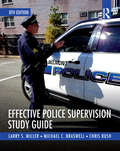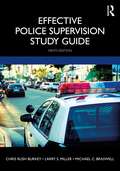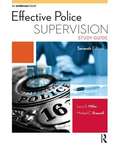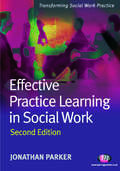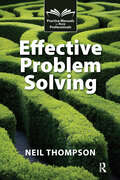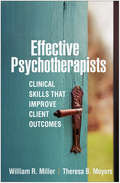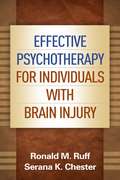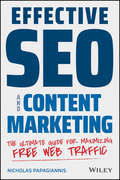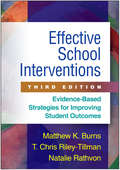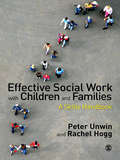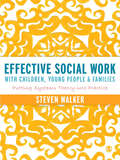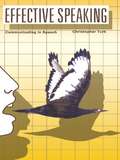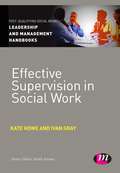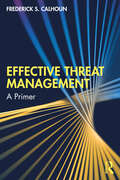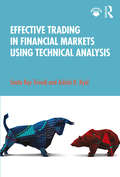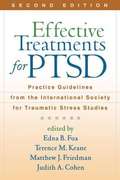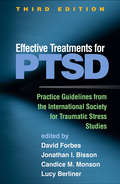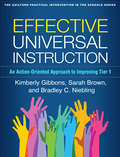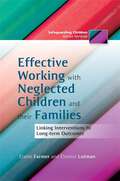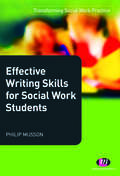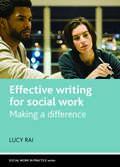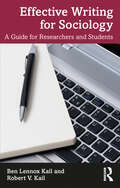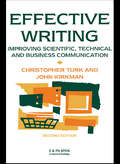- Table View
- List View
Effective Police Supervision Study Guide
by Larry S. Miller Michael C. Braswell Chris RushGood police officers are often promoted to supervisory positions with little or none of the training it takes to be a good manager. An understanding of group behaviors and organizational dynamics is necessary to grasp the fundamentals of managing police officers. The Effective Police Supervision Study Guide coordinates with the core text used in many college-level classes and police departments to teach supervisory practices in criminal justice. This study guide prepares both students and professionals for academic or promotional exams, offering them an opportunity to fully review the material so that they are well-prepared for testing. This new edition, like the new edition of the textbook it accompanies, includes information on the following topics: police accountability, police involvement with news media, the challenges of dealing with social media, updates on legal considerations, and ways to avoid another controversy like Ferguson, Dallas, or Baltimore.
Effective Police Supervision Study Guide
by Larry S. Miller Michael C. Braswell Chris Rush BurkeyGood police officers are often promoted to supervisory positions with little or none of the training it takes to be a good manager. An understanding of group behaviors and organizational dynamics is necessary to grasp the fundamentals of managing police officers. The Effective Police Supervision Study Guide coordinates with the core text used in many college-level classes and police departments to teach supervisory practices in criminal justice. This study guide prepares both students and professionals for academic or promotional exams, offering them an opportunity to fully review the material so that they are well-prepared for testing. This new edition, like the new edition of the textbook it accompanies, includes information on the following topics: police accountability, police involvement with news media, the challenges of dealing with social media, updates on legal considerations, and ways to respond to current issues facing law enforcement with COVID-19 and managing protests.
Effective Police Supervision Study Guide
by Larry S. Miller Michael C. BraswellGood police officers are often promoted into supervisory positions with little or no training for what makes a good manager. Effective Police Supervision provides readers with an understanding of the group behaviors and organizational dynamics necessary to understand the fundamentals of police administration. The Effective Police Supervision Study Guide, which includes quizzes and other study tools, gives students, as well as professionals training for promotional exams, a way to review the material and be fully prepared for examinations and the world of police supervision. This new edition, like the new edition of the textbook it accompanies, includes information on the following topics: police accountability, police involvement with news media, dealing with social media, updates on legal considerations, and avoiding scandals.
Effective Practice Learning in Social Work (Transforming Social Work Practice Series)
by Jonathan ParkerThe Department of Health requires students on the social work degree to undertake at least 200 days in direct practice learning during their course. Practice learning often raises great anxieties for students, agencies and those who supervise and assess it. This book tackles those anxieties, explaining the ways the experience can deliver a unique learning opportunity for the student. It is ideal for students undertaking or about to undertake practice learning, student supervisors and practice assessors, as well as trainers and policymakers within social care agencies and health care professions where practice learning is also undertaken.
Effective Problem Solving (Practice Manuals for Busy Professionals)
by Neil ThompsonA bumper book of powerful problem-solving tools and techniques presented clearly and concisely by a highly respected author.Practitioners across the range of human services and managers in all sectors are constantly faced with problems of various kinds. Each of these is unique, however there will be general patterns that we can learn from. This book draws upon the author's extensive experience in teaching and training on problem-solving, providing students, practitioners and managers with a powerful repertoire of tools that can make a real difference in a wide range of situations.This easy-to-read text incorporates new challenges in the modern workplace such as; Artificial Intelligence, increased job insecurity, neurodivergence in relation to problem-solving, and safeguarding our habitat. Packed with critical exercises and opportunities for reflection, Effective Problem Solving encourages readers to analyse difficult situations and provides guidance on how to respond to these challenges head-on, making a real impact. This book is a handy guide that will increase readers' skills and confidence.
Effective Psychotherapists: Clinical Skills That Improve Client Outcomes
by William R. Miller Theresa B. MoyersWhat is it that makes some therapists so much more effective than others, even when they are delivering the same evidence-based treatment? This instructive book identifies specific interpersonal skills and attitudes--often overlooked in clinical training--that facilitate better client outcomes across a broad range of treatment methods and contexts. Reviewing 70 years of psychotherapy research, the preeminent authors show that empathy, acceptance, warmth, focus, and other characteristics of effective therapists are both measurable and teachable. Richly illustrated with annotated sample dialogues, the book gives practitioners and students a blueprint for learning, practicing, and self-monitoring these crucial clinical skills.
Effective Psychotherapy for Individuals with Brain Injury
by Ronald M. Ruff Serana K. ChesterCombining scientific expertise with psychotherapeutic acumen, this book is highly accessible and packed with clinical tools. Part I provides essential information on how acquired brain injury affects emotional functioning. Part II describes practical, specially tailored ways to treat anxiety, depression, and anger related to brain damage, and to help patients regain a sense of meaning and value in their lives. The book shows how standard psychotherapeutic interventions can be adapted for the brain-injured population, as well as which approaches may be contraindicated. It presents a biopsychosocial framework for assessment and treatment that integrates emotional support, cognitive-behavioral techniques, and acceptance- and mindfulness-based strategies.
Effective SEO and Content Marketing: The Ultimate Guide for Maximizing Free Web Traffic
by Nicholas PapagiannisGet beyond the basics and see how modern-day users are reimaging the SEO process SEO is often underutilized and overlooked across the marketing realm today. SEO is not merely trying to improve your website ranking on Google, but it can spark and optimize ideas. Above all it can help improve the amount of free traffic coming to your web properties. This book provides you with a comprehensive approach to make sure marketing spend is utilized as effectively as possible and deliver the best ROI for your brand and business. Maximizing your organic (free) traffic channels should be a top priority and this book will provide you with insight on how to do that. From working with social media influencers to steering creative ideas and campaigns, modern day SEO requires a full-service perspective of marketing and its processes. General education on SEO and organic content marking Understanding which search engines to focus on How SEO and content can solve business problems Building a new brand through SEO and content Identifying who your true competitors are Which Analytics reports you should be regularly monitoring How to establish research channels that can inform your business initiatives Building personas and audience purchase journeys Prioritizing locations, demographics and countries What needs to be in place to maximize free traffic levels to your brands assets Understanding all the key tasks and attributes for an effective content program Data-Driven Content: Detailed instruction on how to use data to inform content responses, ideas and asset types Understanding different content asset types from standard items like articles to highly advanced assets like films, podcasts, white papers and other assets Calculating ROI for SEO and Content initiatives Small business marketing via content and SEO and having the right small business mindset for success Website and content design considerations (accessibility, principles of marketing) Optimizing for the future and looking at other search venues Amazon Optimization YouTube Optimization App Store Optimization (ASO) Podcast Optimization Optimizing Blogs and other off-site content Prepping and optimizing for the newest technologies, including voice search, artificial intelligence, and content discovery vehicles How to build an optimization path and programs that drive results and manage risks In addition to learning the most effective processes to structure your SEO, you will have access to bonus materials that accompany this book which will include worksheets, checklists, creative brief examples, quizzes, and best interview questions when hiring an SEO specialist. Modern-day marketers, business owners, and brand managers, this book is for you!
Effective Safeguarding for Children and Young People: What next after Munro?
by Maggie Blyth Enver SolomonThe number of children entering the child protection system has risen dramatically in the last three years with implications for children's services and partner agencies. This timely volume takes a critical look at the impact of the Munro Review (2011) on child protection and the Government's response. It looks at questions including how effective Local Safeguarding Children Boards are in providing the necessary scrutiny to ensure children are safe, how the early offer of help at local level might reduce the numbers of children at the critical end of the spectrum and whether reducing regulation from the centre will result in better outcomes for the most vulnerable? Moreover, it also considers those young people who traditionally bypass child protection services but remain at risk of harm. These are critical questions for both policy and practice in understanding the reforms Munro states are required. Contributions from leading experts working in the child protection system review current safeguarding policy and explore the future after Munro.
Effective School Interventions: Evidence-Based Strategies for Improving Student Outcomes
by Natalie Rathvon Matthew K. Burns T. Chris Riley-TillmanThis indispensable course text and practitioner resource, now fully revised, has helped tens of thousands of readers implement evidence-based interventions to improve students' academic achievement and behavior in PreK–12. The volume presents best-practice guidelines and step-by-step procedures for 83 interventions that can easily be implemented by teachers and other school-based professionals. It is a go-to book for those working in a multi-tiered system of support (MTSS) or response-to-intervention (RTI) framework. User-friendly features include recommended print and online resources and 10 reproducible forms. Purchasers get access to a webpage where they can download and print the reproducible materials in a convenient 8 1/2" x 11" size. New to This Edition: *Updated throughout to reflect current research-based best practices. *20 new interventions. *Chapter on important skills for intervention success. *The intensity of each intervention (classwide, small-group, and/or individual) is now specified. *Behavior chapter has been reorganized for easier use. *Downloadable reproducible tools.
Effective Social Work with Children and Families: A Skills Handbook
by Peter Unwin Rachel HoggSocial work with children and families is constantly in the headlines and social workers′ decisions are subject to ever increasing scrutiny at all levels. This aspirational book supports students and newly qualified social workers and suggests practical ways in which they might thrive, rather than just survive, in practice Written at a time when Social Work Reform Board and the Munro Enquiry are charged with looking at issues of effectiveness within children and families social work, the book tackles the different challenges that students and practitioners can be faced with, outlining common pitfalls and how to avoid these. Key topics covered include: - Legislation and policy - Child development - Safeguarding and child protection - Assessment - Communication - Looking after yourself Reflective questions are used throughout the book, ensuring that students critically evaluate their own practice. Case examples and case studies drawn from the authors′ recent practice are included throughout the book to illuminate the realities of contemporary social work with children and families. This text will be essential reading for undergraduate and postgraduate students, particularly as they prepare to go on placement. It will also provide valuable reading for qualified social workers who are interested in fresh and effective approaches to practice.
Effective Social Work with Children, Young People and Families: Putting Systems Theory into Practice
by Susan WalkerThis book looks at the changing context of children and young people′s services heralded by the structural, organisational and funding changes put forward in Eileen Munro′s Review of Child Protection. It is strongly grounded in research and theory, and gives specific consideration to how systems theory can help practitioners in understanding families. It highlights the need for every social work practitioner to develop the capacity to undertake unified assessments and interventions in a wide variety of settings with individuals, families, and groups where there are child protection and safeguarding concerns. With case studies, interactive activities, summaries and guidance throughout, this book will be essential reading for all social work students and qualified social work practitioners, as well as all those involved in the field of child protection.
Effective Speaking: Communicating in Speech
by Christopher TurkEffective Speaking provides the hard scientific information about audience psychology, text preparation, presentation methods, voice production, body language and persuasive advocacy which will help would-be speakers improve their performance. The emphasis throughout is on practical self-help, on methods which have been shown to work, with clear explanations of just why they are effective.
Effective Supervision in Social Work (Post-Qualifying Social Work Leadership and Management Handbooks)
by Ivan Lincoln Gray Kate HoweIt is vital that social work managers and leaders are able to deliver and manage effective supervision to their teams. Recent social work reports such as the Munro Review into Child Protection (2011) identified poor supervision as a barrier to good and effective social work practice and highlighted the need for quality supervision to become embedded within departments. This book demonstrates how both managers and their staff can engage with supervision with a view to successful outcomes. There are detailed sections on audit tasks and reflection questions to enable readers to increase awareness of their role as well as develop action plans for improvement in their practice.
Effective Threat Management: A Primer
by Frederick S. CalhounEffective Threat Management: A Primer presents the ABCs for identifying, assessing, and managing potentially violent individuals. By offering practical advice and tactics for dealing with problem individuals, the Primer serves as an ideal reference source for threat management professionals and as a practical introduction to threat management best practices for those new to the field. The question-and-answer format makes finding information easy. The book offers tips and cautions on practical ways to implement an effective threat management program in various situations, such as interpersonal relationships, schools, workplaces, public gathering places, or religious establishments. The Primer emphasizes practical, field-tested approaches to the challenges of identifying, assessing, and managing problem individuals.In the Primer, author Frederick S. Calhoun, a respected expert in threat assessment and management, shows how to set up a threat management process free of elaborate procedures or significant commitments of resources. The Primer offers a practical, step-by-step process for identifying, assessing, and managing problem individuals. Each section answers specific questions. A quick reference guide allows users to quickly locate specific issues or topics. Text boxes throughout the Primer offer practical support, helpful cautions, and real case-study illustrations.This user-friendly book will help threat management professionals in law enforcement and security positions as well as other professionals potentially facing threats, such as mental health practitioners, teachers, HR professionals, small business owners, and anyone else confronted with the need for threat management.
Effective Trading in Financial Markets Using Technical Analysis
by Smita Roy Trivedi Ashish H. KyalThis book provides a comprehensive guide to effective trading in the financial markets through the application of technical analysis through the following: Presenting in-depth coverage of technical analysis tools (including trade set-ups) as well as backtesting and algorithmic trading Discussing advanced concepts such as Elliott Waves, time cycles and momentum, volume, and volatility indicators from the perspective of the global markets and especially India Blending practical insights and research updates for professional trading, investments, and financial market analyses Including detailed examples, case studies, comparisons, figures, and illustrations from different asset classes and markets in simple language The book will be essential for scholars and researchers of finance, economics and management studies, as well as professional traders and dealers in financial institutions (including banks) and corporates, fund managers, investors, and anyone interested in financial markets.
Effective Treatments for PTSD, Second Edition
by Edna Foa Terence KeaneDeveloped under the auspices of the PTSD Treatment Guidelines Task Force of the International Society for Traumatic Stress Studies, this tightly edited work is the definitive best-practice reference for practitioners caring for any trauma population. Leading clinical scientists thoroughly review the literature on widely used therapeutic approaches for both adults and children. Succinct treatment guidelines are presented that feature standardized ratings of the evidence for each approach. The book also offers insightful guidance to help clinicians select the most suitable therapy for particular patients and overcome frequently encountered obstacles. New to This Edition Expanded with six additional chapters on child and adolescent treatments. Adult chapters thoroughly revised to reflect the rapidly growing evidence base. Chapter on treating other psychiatric problems that co-occur with PTSD.More coverage of early intervention and prevention.
Effective Treatments for PTSD, Third Edition: Practice Guidelines from the International Society for Traumatic Stress Studies
by David Forbes, Jonathan I. Bisson, Candice M. Monson, Lucy BerlinerGrounded in the updated Posttraumatic Stress Disorder Prevention and Treatment Guidelines of the International Society for Traumatic Stress Studies (ISTSS), the third edition of this definitive work has more than 90% new content. Chapters describe PTSD assessment and intervention practices that have been shown to work and provide practical, real-world implementation guidance. Foremost authorities address the complexities of trauma treatment with adults, adolescents, and children in diverse clinical contexts. The book delves into common obstacles and ways to overcome them, when to stop trying a particular approach with a client, and what to do next. Special topics include transdiagnostic interventions for PTSD and co-occurring problems, dissemination challenges, and analyzing the cost-effectiveness of treatments. Prior edition editors: Edna B. Foa, Terence M. Keane, Matthew J. Friedman, and Judith A. Cohen. New to This Edition *Fully rewritten to reflect over a decade of clinical, empirical, and theoretical developments, as well as changes in DSM-5 and ICD-11. *Increased research-to-practice focus--helps the clinician apply the recommendations in specific clinical situations. *New chapters on previously covered treatments: early interventions, psychopharmacotherapy for adults and children, and EMDR therapy. *Chapters on additional treatments: prolonged exposure, cognitive processing therapy, cognitive therapy, combined psychotherapy and medication, e-mental health, and complementary and alternative approaches. *Chapters on cutting-edge topics, including personalized interventions and advances in implementation science.
Effective Universal Instruction: An Action-Oriented Approach to Improving Tier 1 (The Guilford Practical Intervention in the Schools Series)
by Sarah Brown Kimberly Gibbons Bradley C. NieblingThis accessible volume helps school leadership teams accomplish the crucial yet often overlooked task of improving universal instruction--Tier 1 within a multi-tiered system of support (MTSS). Strong universal instruction reduces the numbers of PreK–12 students who may need additional services and supports. Providing clear action steps and encouraging guidance, the expert authors present a roadmap for evaluating the effectiveness of Tier 1, identifying barriers to successful implementation, and making and sustaining instructional improvements. In a large-size format with lay-flat binding for easy photocopying, the book includes 27 reproducible checklists, worksheets, and forms. Purchasers get access to a Web page where they can download and print the reproducible materials. This book is in The Guilford Practical Intervention in the Schools Series, edited by T. Chris Riley-Tillman.
Effective Urban Densification: A Guide for Professionals and the Housing Industry
by Barry JohnsThe housing crisis confronts two of North America’s contemporary urban challenges: affordability and the need to curtail urban sprawl through densification of existing communities. Advancing a novel formula labelled BAAKFIL, this book introduces a new way of thinking about affordability and revitalization of mature neighbourhoods and communities. Beginning with an exploration of the monoculture of homogenous, average quality suburban housing stock in North America, subsequent chapters explore the serious issue of land cost; infill, zoning and Nimbyism in the context of the mass housing industry. Then, bridging the gap between theory and practice, the author introduces a theoretical design approach (BAAKFIL) as a practical formula for adding affordable residential units in established single family neighbourhoods while respecting their defining features. The final chapters evaluate the efficacy of BAAKFIL as a conceptual model by exploring various ‘test bed’ sites where the framework is applied. This book will be a valuable resource for practicing architects in the housing domain, as well as for planners working in municipalities. It will also appeal to advanced undergraduate and postgraduate students of urban design and architecture.
Effective Working with Neglected Children and their Families: Linking Interventions to Long-term Outcomes
by Elaine Farmer Eleanor LutmanParents who neglect children present considerable challenges to child welfare professionals, and are often resistant to change. This book addresses an urgent need to ensure that social care interventions provide better long term outcomes for neglected children across services. Based on a substantial research study into social care provision for children, it provides a rare insight into the experiences of neglected children over a period of five years, examining the responsiveness of parents and children to social care support and their progress. Close-focus study of the decisions made on either side of services - by the children, the parents, the caregivers and related social and healthcare professionals - shows what works and what doesn't, in the long term. This important book highlights gaps in provision for neglected children after the initial referral stage, the risks and potential for professional interventions and how well the child protection system and the courts protect children. It suggests ways that local authorities and other professionals can meet the complex needs of the children most likely to fall through the safety net, the factors related to good outcomes for them and how to improve safeguarding strategies within and beyond children's services. Providing a critical account of policy, systems and practice, this book is essential reading for anyone who needs the latest evidence about safeguarding children, including policymakers, social workers and professionals in health care and the family justice system.
Effective Writing Skills for Social Work Students (Transforming Social Work Practice Series)
by Phil MussonThis concise text is written specifically to help students and practitioners hone their techniques and develop their skills when it comes to writing in a clear, accessible and, above all, rigorous manner. There are sections on good essay writing and how to construct an argument, referencing and plagiarism, and reflective and critical writing. More than just another study skills book, Effective Writing Skills for Social Work is focused on real, day-to-day practice issues and the complex academic demands faced by social work students.
Effective Writing for Social Work: Making a Difference (Social Work in Practice series)
by Lucy RaiBased on original research, this book offers students an insight into the nature and challenges of writing in social work practice, enabling them to improve their writing skills. It explores the ways in which both students and qualified social workers can be more effective in their writing through an awareness of the purpose, context and audience. It makes explicit the connections and differences between learning to write in university and communicating through writing in practice and explores the impact that new technologies have on academic and professional writing. Drawing on both research and examples from practice, Effective writing for social work is a valuable tool for students, educators, practitioners and managers to critically examine ways in which writing could better support best practice in social work.
Effective Writing for Sociology: A Guide for Researchers and Students
by Robert V. Kail Ben Lennox KailWriting well is an essential skill for sociologists, but few books help students learn to write well. Designed to help students produce a manuscript that is clear, concise, and compelling, Effective Writing for Sociology demonstrates and deconstructs what makes effective writing and how best to communicate scholarly ideas. The first half of the book addresses the fundamentals of good writing: writing clearly, conveying emphasis, writing concisely, and crafting effective paragraphs. The second half then looks to the three most important sections of a research report: framing an introduction, reporting results, and discussing findings. Each chapter of the book describes strategies for effective writing, illustrated with multiple examples and providing exercises where students can try their hand at implementing these strategies. The Epilogue provides tips on choosing a title as well as writing an abstract and method section; it also includes suggestions on how to master the tips described in the lessons. Ben Lennox Kail and Robert V. Kail’s book is essential reading in courses on research methods, qualitative methods, quantitative methods, sociological writing, and social science writing in allied disciplines such as education, criminology, health, and all research fields.
Effective Writing: Improving Scientific, Technical and Business Communication
by John Kirkman Christopher TurkEffective communication is vital to science, engineering and business management. This thoroughly updated second edition with a new chapter on the use of computers and word-processors gives clear, practical advice illustrated with real-life examples on how to select, organize and present information in reports, papers and other documents.
